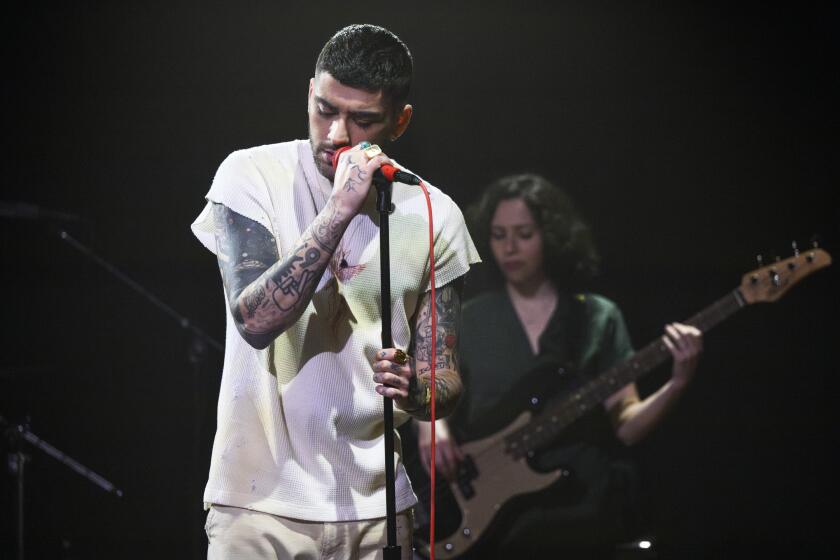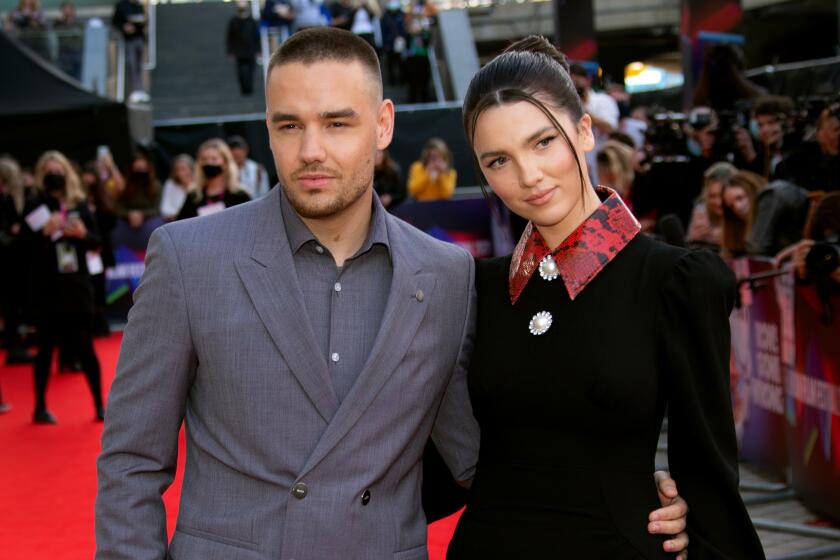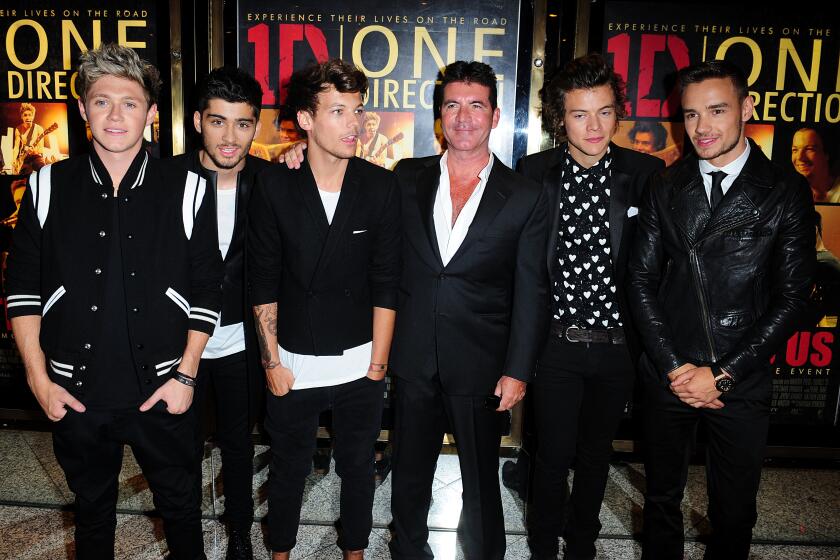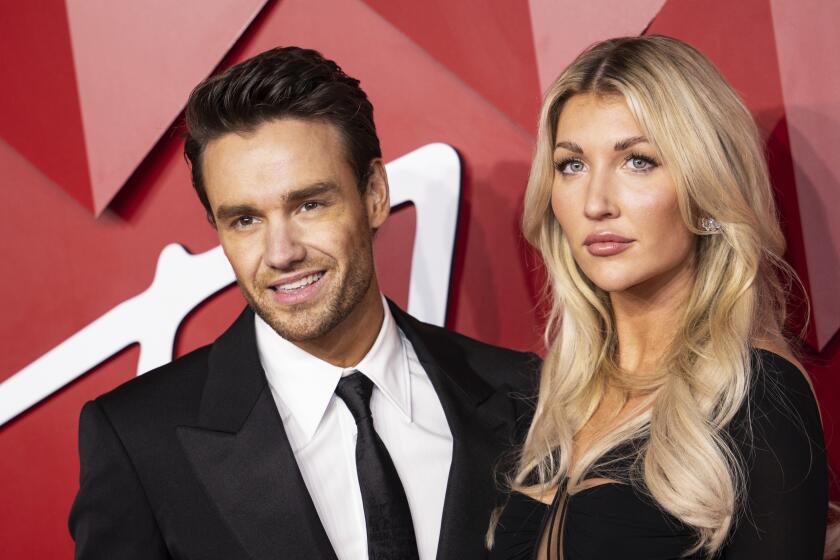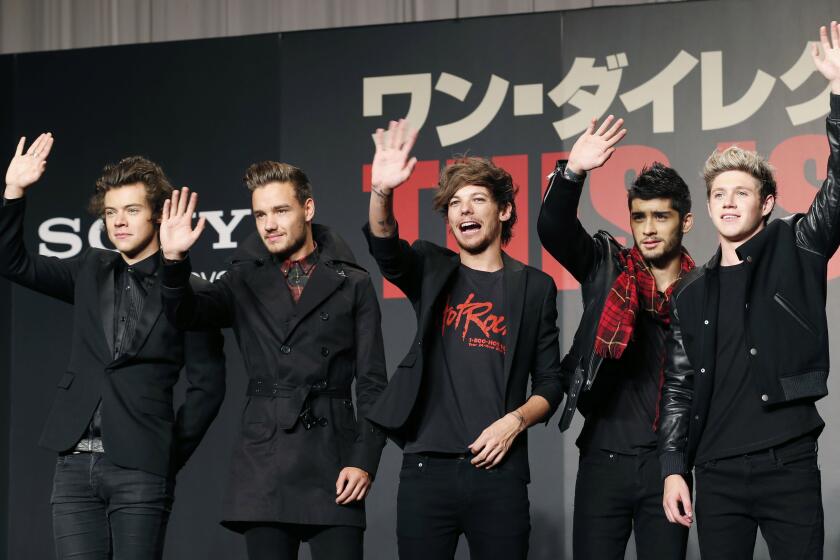A Melding of Spirits
The association between Ravi Shankar and George Harrison dates back more than three decades, to their meeting in 1966 in London. Shankar, now 76, was already a much honored artist at the time, one who had toured Europe and the United States, recorded widely and composed music for films. But the connection with Harrison, the lead guitar in the enormously popular Beatles, gave him a kind of instant recognizability with the then-emerging boomer generation. Shankar appeared at the Monterey Pop Festival, at Woodstock and in Harrison’s 1971 Concert for Bangladesh (which also resulted in Shankar’s second Grammy when the soundtrack won a 1972 Grammy for best album). The new popular fame was a strange development in the life of a musical artist who had traveled and performed, until that time, largely within the rarefied world of classical music and dance. Shankar, who performs tonight at Pasadena City College, started out in the early ‘30s as a very young dancer with the internationally touring troupe of his brother, legendary Indian dancer Uday Shankar, returning to India in 1938 to devote himself to music. For the next seven years, Shankar was a musical disciple of Ustad Allaudin Khan, a great teacher and the father of sarod master Ali Akbar Khan. By the late ‘40s, his career had blossomed, both as a performer and a composer. He composed the music for the classic 1955 Satyajit Ray film “Pather Panchali” and toured extensively abroad, occasionally appearing with close friend and supporter, violinist Yehudi Menuhin. He performed with symphony orchestras, exchanged improvisations with jazz musicians, and gave lessons to Don Ellis and John Coltrane. All this before the Harrison meeting that changed Shankar’s life and opened the pop music window to the music of the outside world. The pair’s relationship has continued over the years and grown into a long-term friendship, with Harrison producing several more Shankar albums. Last year, Harrison co-produced “Ravi: In Celebration” (Angel), a superb, four-CD boxed set surveying the full range of Shankar’s accomplishments, not only as a virtuosic sitarist, but also as a composer in a wide variety of genres. On Tuesday, Angel released the Harrison-produced “Chants of India,” an album based upon Vedic scriptures, which are among the most ancient religious texts of the Indo-European languages. The music, orchestrated and set by Shankar (who also added several original compositions in the same style), differs from the sitar and tabla music with which he is usually associated. Harrison, 54, who has studied sitar, is modest about his own skills with Indian music, and chose to participate in the album only peripherally, lending his voice to the chorus and playing some acoustic guitar, bass, autoharp and glockenspiel. Discussing the project in a telephone conversation from London and Encinitas, Harrison and Shankar also touched upon their long professional and personal friendship.
Question: Westerners have been fond of Indian music since the big breakthroughs of the ‘60s--primarily via Ravi’s music--without necessarily acknowledging or even being aware that it is a classical music based upon a complex system of knowledge and performance. What do you feel are the elements that make this sometimes dense form of expression so accessible to Western ears?
Harrison: You don’t have to know all about it, you just have to be open to it--to the rhythms and the sounds of it. You don’t have to know exactly how they do it. Which in some sense, I guess, is what led to the bastardization of Indian music, which, I suppose, I started back with “Norwegian Wood.” But, you know, all I was doing really was trying to get the sound. You can’t resist the sound of the instruments, you can’t resist the sound of Indian classical music if you’re ready to surrender to it and not judge it. Just accept it and listen to it. Which is why I got into it. It was just overpowering, in a transcendental way.
Shankar: I feel that our music touches all the senses, going from the sublime to the ridiculous. It has all the fun and excitement of rock and jazz, and at the same time it touches your deeper sense also. Whether you are conscious of it or not, whether it is told to you by a lecture that our music is spiritual, is not really important. What is that advertisement? “You’ve come a long way, baby. . . .” Our music has gone through so much development. But its roots, which has something to do with its feelings, the depth from where you bring out the music when you perform, touches the listeners even without their knowing it. Yes, the music has become more sophisticated, more like concert music, the way any classical music does, but it maintains its contact with those roots.
Q: How did you go about putting this unusual project, with its Vedic hymns and chanting, together?
G.H.: To tell the truth, Ravi figured everything out--how it was going to run, which order it should go in. The total concept was Ravi’s, really. Basically more or less everything we recorded is on the album, in the order that he conceived it while we were doing it. So, as a producer, that was one thing I didn’t have to bother with.
R.S.: I chose the most important mantras from traditional Vedic and Upanishad [ancient Indian spiritual texts] sources, those which dealt with health--mental health, spiritual health, physical health, well-being, all the goodness and prayers for nature, the planet and peace. I wanted to have them directed toward well-being for everything, because we are going through such havoc at present in the world.
Q: Does it feel appropriate to be translating this ancient, sacred material into a commercial recording medium?
R.S.: The Vedas actually have been done over and over again, in every manner. In India, you wouldn’t believe the number of ways in which they have been interpreted, by famous singers in the classical manner, with simple tampura drones, with synthesizers and saxophones, every way imaginable. What I wanted to do was to maintain a respect for the tradition without making it sound strange for the listeners--to give it a celestial, very spiritual sound.
G.H.: If this is a successful thing, it would be a great bit of handiwork, to be able to get it through to the people. What it is, in disguise, is a great blessing, because the Vedas are pure spiritual energy in the form of sound.
Q: This new recording is the latest product of a relationship that stretches back more than 30 years. Do you remember what it was like in the beginning?
G.H.: It’s almost as though it was scripted, and all I did was follow the script. When I first got a recording of Ravi’s, a World Pacific recording, I put it on, I played it, and inside of me I had an instinctive feeling that I was going to meet him, which I did. And all the other things have been a byproduct of that relationship. I went to India to learn some music with Ravi, but my main quest was that I wanted to know about the yogis. But Ravi was like my input into it. Through him I was able to hear the best music, buy the best incense, read the best swamis, meet the best people. I was very, very fortunate to become friends with him. And consequently all the goodness that I feel has come to me in my life is a direct effect of being plugged into that Indian-ness or Indian tradition or whatever that I gained through Ravi.
R.S.: In the beginning, when we met back in 1966, I found him very immature, naturally, because he was very young then. But still he had tremendous passion in wanting to know about India, Indian yogis, Indian music, Indian philosophy, Indian food and all that. And through the years, I thought, you know, this too shall pass. But I introduced him to this book, “Autobiography of a Yogi” by Paramahansa Yogananda, and that put him on a serious approach. Then he tried himself with Maharishi Mahesh Yogi and the Krishna people, but he always came back to me through music. In fact, it is mainly through music that I pushed him further and further, and today I find him to be so much into it, more than ever before--not in a superficial manner, but deeply into it.
Q: So the relationship has had a powerful impact upon both your lives?
G.H.: In one way, it’s kind of given me a life. Because if you don’t know who you are and where you’ve come from and where you’re going, really, what is life? You can have all the money in the world and all the glory. But if you don’t know what is the point, then your life is empty. So, in that respect, Ravi--not just Ravi, but he was the main ingredient--patched me into the Vedic tradition. And from that I’ve learned all these things about yoga, about meditation, about what it is, about what are we doing here, about what is the goal. I’ve come to understand incredible stuff, just through pursuing that. Without it, I’d just be a boring old fart.
R.S.: To me, George is, I don’t know how to describe it, a son, a friend, someone very dear, and I love him very much. He has given me so much love and respect that my heart is full of it.
* Ravi Shankar at the Sexson Auditorium at Pasadena City College. 1570 E. Colorado Blvd., Pasadena. Tonight at 8:30. His appearance is the final event in a full day of Indian musical events. At 2:30 p.m., santoor player Shivkumar Sharma performs; at 5:15 p.m., vocalist Ajoy Chakrabarty performs; a bazaar will offer folk crafts, clothing and textiles, and Indian food will be available. Tickets are $50 and $75. Information: (818) 449-6987.
More to Read
The biggest entertainment stories
Get our big stories about Hollywood, film, television, music, arts, culture and more right in your inbox as soon as they publish.
You may occasionally receive promotional content from the Los Angeles Times.



